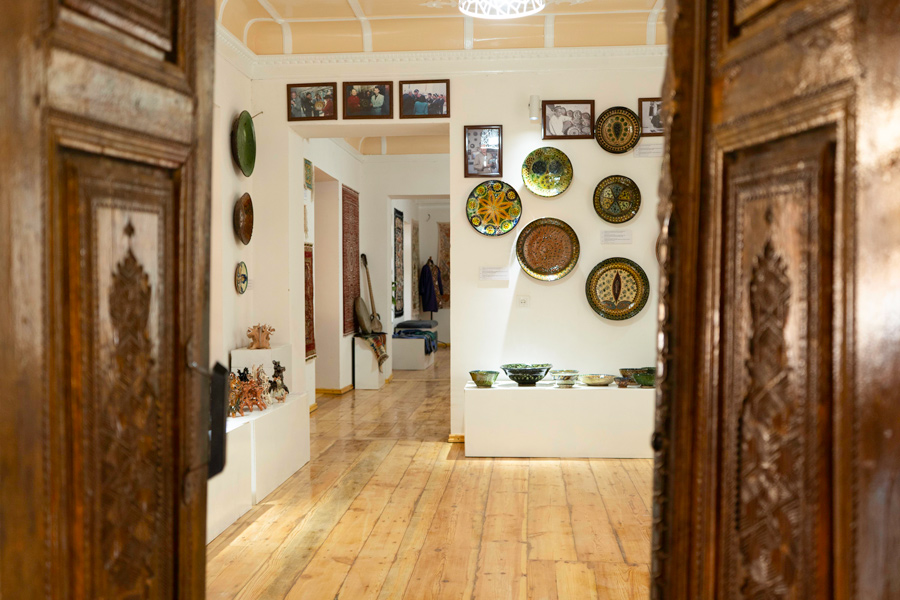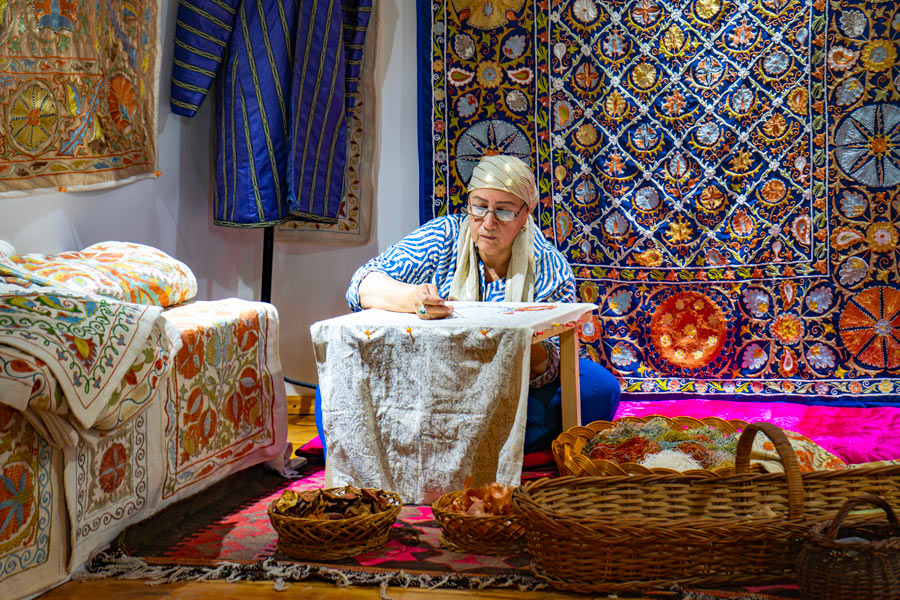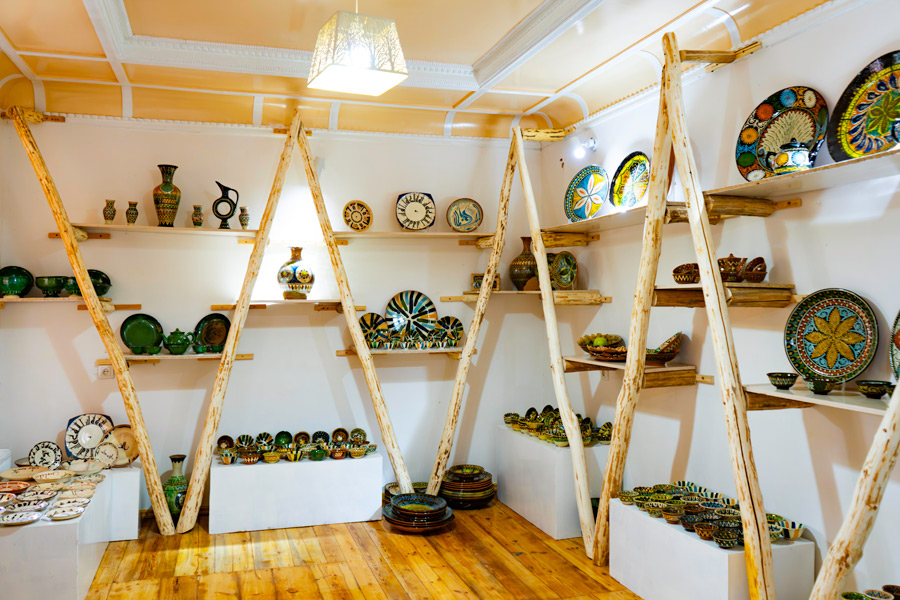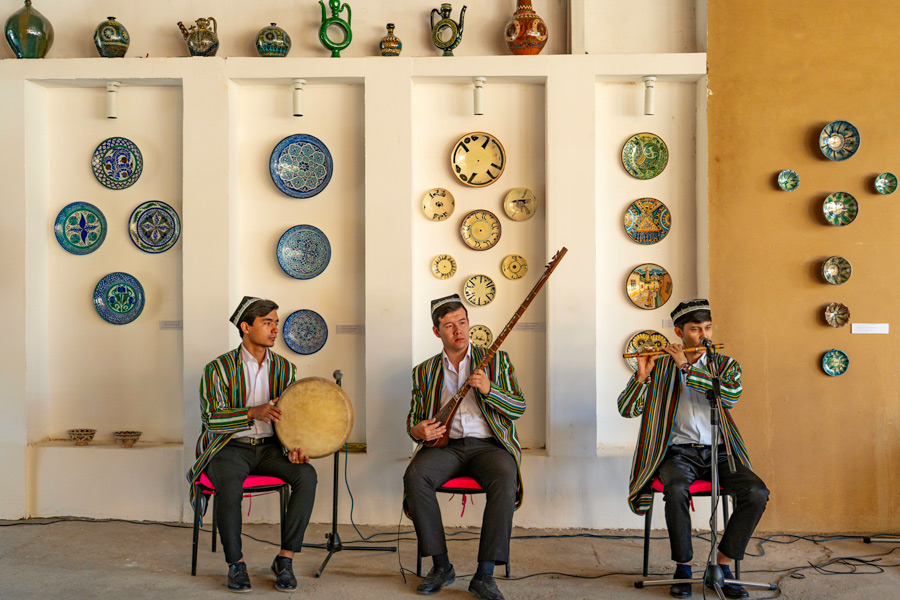
Risola Handicraft Center’s Adress: 162 Zulfiqar Street, Uchtepa District, Tashkent.
A recent addition to Tashkent’s cultural landscape, Risola Handicraft Center opened on September 27 as a hub for living craft traditions. This creative space brings together traditional workshops, a ceramics museum, a craft gallery, and a culinary corner, all designed to reflect the spirit of a traditional Uzbek home. The project was initiated by Abdulla Narzullaev, a People’s Master of Uzbekistan and a representative of the Narzullaev dynasty, which has produced eight generations of ceramists. He is the younger brother of renowned ceramic artist Alisher Narzullaev. The project was co-authored by his daughter, Dilnoza Narzullaeva, in collaboration with the Gijduvan Handicraft Center and the Hunarmand Association of Uzbekistan.
Located in a 1960s-era building in the Uchtepa District, Risola has been transformed into a space that recreates the warmth, textures, and colors of a real Uzbek household. Rather than functioning as a static museum, it invites visitors to actively engage with living aspects of Uzbek culture.
Traditional Craft Workshops

At the heart of Risola are its working studios, where guests can try their hand at crafts practiced for generations across Uzbekistan. These workshops offer a direct connection to the country’s material culture, encouraging visitors to engage with heritage not as spectators, but as participants.
In the pottery studio, visitors shape clay on the wheel, decorate ceramics, or create khushtak — small clay whistle toys. The experience is guided by master artisans who share their methods, tools, and forms, each of which reflects the traditions of specific regions.
The embroidery workshop introduces the vibrant language of Gijduvan needlework, including bosma (stitched by needle) and yurma (worked with a hook). Local embroiderers explain the symbolic meanings and construction of patterns while demonstrating how these labor-intensive techniques are passed down and adapted.
In the carpet weaving space, Mahfuzabonu Narzullaeva, a key figure in the revival of Bukhara’s silk carpets, leads the process. Using natural dyes and traditional looms, weavers demonstrate how each knot is placed with careful attention. The rhythm of work, the geometry of the design, and the slowness of the process all reveal the deep concentration and precision this craft requires.
Culinary Traditions of Uzbekistan
Risola also offers insight into traditional Uzbek cuisine. Guests not only watch but take part in preparing two iconic dishes: Oshi sofi, a Bukhara-style pilaf, and Tuy oshi, the wedding pilaf of Tashkent. These interactive cooking workshops reveal the shared nature of Uzbek meals, where the process of preparation is as meaningful as the food itself, connecting participants to a long-standing culture of hospitality.
Museum of Uzbek Ceramics and Craft Gallery

Beyond the studios, Risola features a ceramics museum that brings together pieces from over fifteen regional centers of Uzbekistan and neighboring Afghanistan. A special focus is placed on the Narzullaev family’s 200-year ceramic legacy, offering context for how styles, glazes, and techniques have developed over time. The collection invites comparison between regional schools and shows the depth of the ceramic tradition.
Adjacent to the museum is a gallery displaying contemporary ceramic works by artists from across the country. Here, tradition meets reinterpretation. The contrast between historical forms and modern expression shows how craft in Uzbekistan continues to evolve while remaining grounded in place and lineage.
Community and Cultural Sustainability
Risola also serves as a platform for social support and education. The center offers free instruction in crafts to members of the local community who are struggling financially, helping them develop skills that can lead to sustainable income. By doing so, Risola connects heritage preservation with everyday livelihoods.
Why Visit Risola?

Risola offers an immersive look at Uzbek culture — not as a distant past behind glass, but as a living system of knowledge and practice. From crafts and food to community and creativity, it is a place where heritage remains active, tangible, and shared. What makes it especially appealing is its convenience: everything is gathered in one place, allowing visitors to explore different aspects of traditional art and daily life within a single setting.
Visits and workshops can be arranged in advance for individuals or groups. The center welcomes tourists, researchers, and anyone interested in Uzbekistan’s living traditions.

